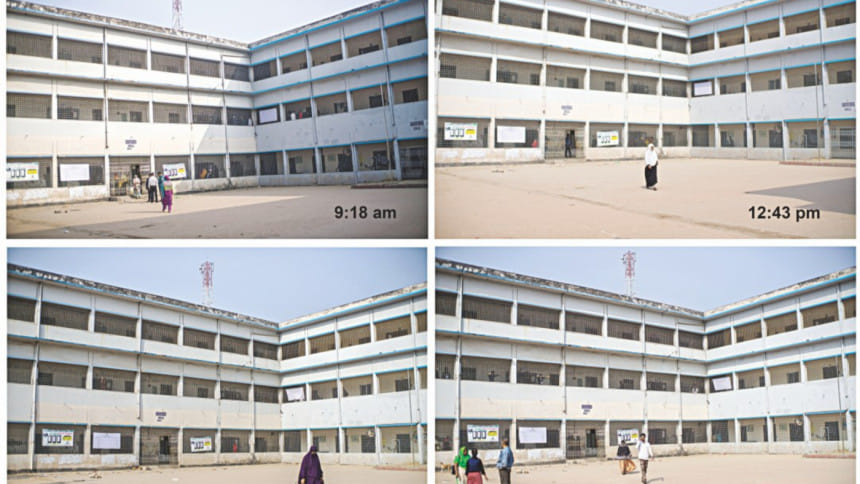Don’t take voters’ apathy lightly

ndifference and apathy are even worse than hatred. And when those are directed to a system rather than an individual, it is dangerous and ominous, even more so when its significance is either not comprehended or disregarded wilfully. Thus, amidst the constant barrage of hyperbole springing from some office-bearers of the ruling party on the causes of the very low turnout in the recently held election in Dhaka city corporations, a sensible explanation was offered by the party's secretary general. He ascribed the reason for the voters shunning the polling centres to public apathy. It was not surprising to the careful observers—the scant presence of voters attending the dry-run practice of EVMs a couple of days before the polls betrayed a lack of enthusiasm among them. It was an indicator of things to come.
However, in the midst of the political theatrics, the only redeeming feature was the EVM, which, despite all its demerits, prevented inflation in the voter turnout figure by the EC, something we witnessed done after the 2014 elections. But nothing is foolproof if the system is operated, and the environment hogged, by only one side. Eyewitness accounts—and there were many in the media—narrated the manner in which the EVMs were used to cast the votes as per the suggestions of those who controlled the system.
It was surprising to hear all kinds of narratives to justify the indifference of the voters of the metropolis, less than 30 percent of whom turned out to choose who they wanted to be the ones holding the important posts of mayors and councillors. It was equally astounding to see the two winning mayoral candidates taking a self-gratifying pleasure in their victory without realising the serious consequences of people's indifference to democracy and democratic institutions in the country. It should be a matter of concern for anyone seeking public office to find himself or herself a winner in a supposedly democratic contest where the vast majority of the stakeholders preferred to remain absent.
Reportedly, the polling booths were not left to the voters alone, as there were other people extraneous to the system present there. While it is not the intention to dwell on the inviolability of the EVM—incidentally, most countries who had introduced the machine in the system have done away with it—it is difficult to explain the symmetry in the pattern of voting as released by the EC in the two city corporations polls.
One wonders whether the ruling party high-ups are aware of this either. If that were the case, the people would have been spared the imprudent comments describing this election as being the "best" in the country's electoral history. One senior AL office-bearer, in his unfathomable wisdom, even accused the BNP, holding it responsible for the low turnout, without offering any plausible explanation. Where, may one ask, were the local AL leaders? What is it that demotivated even them from turning up or herding their supporters to the polling centres? Are we to believe that AL supporters were also swayed by BNP arguments, whatever those were, to keep their distance from the polling centres? It is hard to believe that the BNP has the power to coerce ruling-party supporters into keeping away from voting, when very few of its own agents managed to get inside the centres.
What was betrayed in those insensible, and some might say puerile, comments was either that the ruling party is not aware of the consequences of the issue, or their total indifference to and disregard for the decline of the state of democracy and democratic institutions in the country. Both are dangerous and portend an ominous future for our democracy. The DNCC/DSCC polls have served as a damning indictment of our polity and democratic dispensation. There is no need to undertake any research into the reasons of the low turnout, as one Bangla daily had suggested after the polls. What is needed though is to cogitate on the only reason that the AL secretary general, in a welcome display of objectivity, had suggested—APATHY of the voters.
The word "apathy" should not be taken lightly, as our politicians have done, not in the case of human relationship and even less in the case of elections, voting and voters. A display of apathy or indifference, which is worse than hatred, reflects an abysmal situation in the state.
American author Helen Keller termed the apathy of human beings as the worst kind of evil for which science has discovered no remedy yet. She was, of course, speaking of it in terms of human relationship. But it can be equally worse when it comes to the manifestation of a relationship between the state (government) and the citizens, and can wreak immense damage, as warned by many philosophers, statesmen and politicians. French philosopher Montesquieu considered the apathy of a citizen in a democracy as being more dangerous to public welfare than the tyranny of a prince in an oligarchy.
What one hopes our politicians would do—particularly the ruling party—is to determine how people's apathy and the eventual slide to cynicism can be arrested. The reasons for people turning their back on elections are not far to seek. It is only the politically blind and deaf who are unable to get the message that the people's abstention conveys. Such an eventuality will be detrimental to politics, democracy and public interests. That is something totally unacceptable. Is it not the time to ponder on the matter, particularly in the centenary year of the colossus who had dedicated his life to democracy, the rights of people and freedom of speech?
Brig Gen Shahedul Anam Khan, ndc, psc (Retd) is a former Associate Editor of The Daily Star.

 For all latest news, follow The Daily Star's Google News channel.
For all latest news, follow The Daily Star's Google News channel. 



Comments